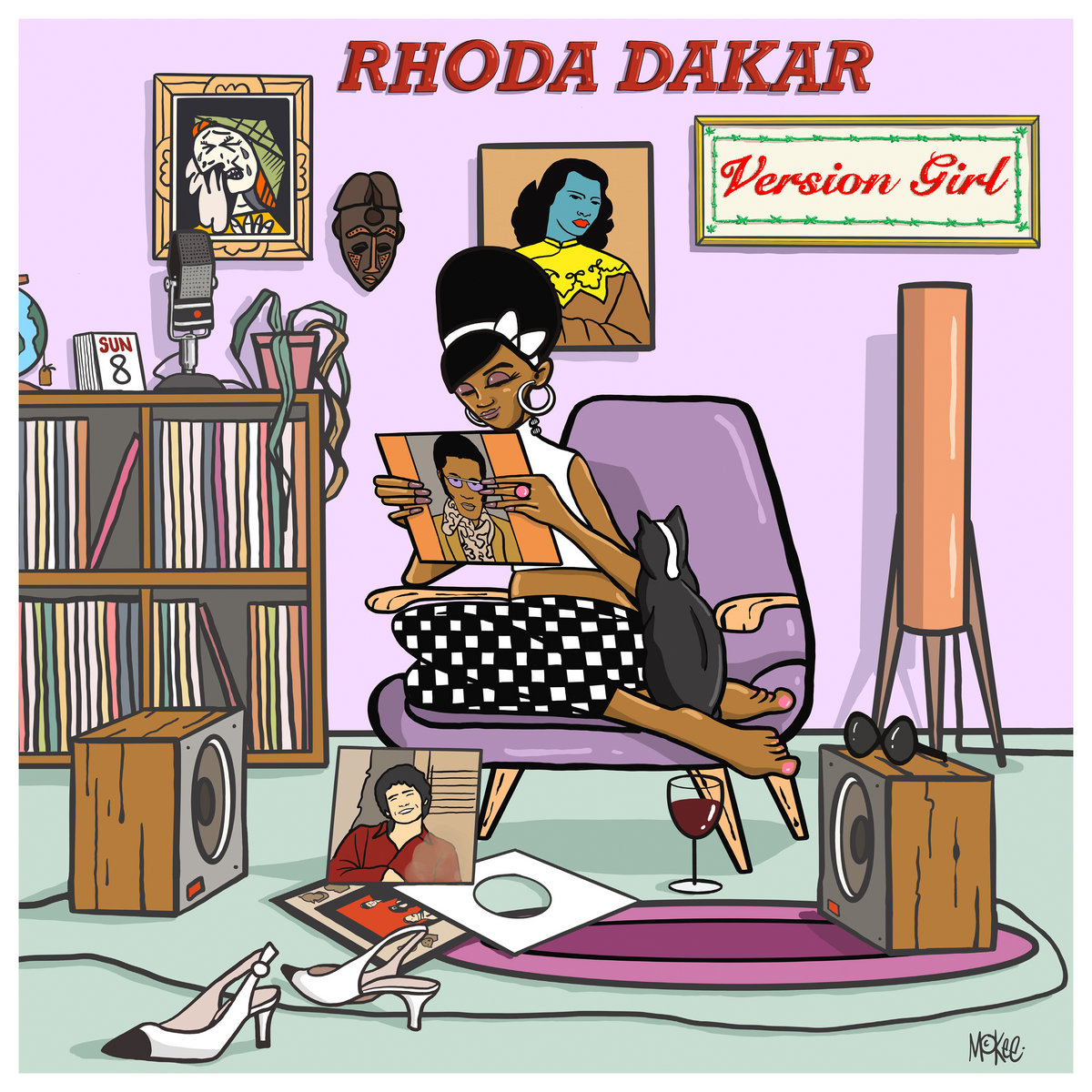An album that makes every day, whatever the time, a Sunday afternoon. I’m describing this release by former The Bodysnatchers vocalist Rhoda Dakar in such a way, because the moment I tuned into these 12 songs, I found it was a to take it easy, slow the pace of life down. In fact, it reminded me of a chocolate ad for Cadbury’s Caramel used perhaps 40 years ago and saw myself melting into the furniture, as Rhoda serenaded me. When compiling songs to use for this album, Rhoda had said that she “…wanted to go left field for this; there seemed no point in covering songs which already had perfectly good Reggae versions. Both UB40 and Madness had already done a series of definitive covers albums. So rather than hanging on their coattails, I went for songs that had no previous definitive Reggae, Ska, or Rocksteady versions…” Here she has certainly provided this take on songs that might otherwise be the genre they had been recorded.
Except for the opening track,’Version Girl’, a song from which the inspiration for this album was drawn, the rest are covers with origins other than ska. ‘Version Girl’ is a cover of Dandy Livingstone’s song, first released in 1970, which coincidentally was later recorded by UB40 for their Labour of Love album in 1983. Here Dakar voices “From 1980, back in the day, we took an old song and did it our way. Now I’m back to do it again, with songs I’ve loved, from way back when…” This sets out how this collection is to proceed and boy can she illustrate a song. Formed in the back-end of the 1970s, The Bodysnatchers were a ska-revival band, although I guess for many of us at that time this was new, fresh and exciting, as we adopted the slim-cut trousers, trilby hats (although for a tall lad, this looked ridiculous), along with the cut and colour of our clothes and if we we brave enough the buzz cut. In the early ’80s, 2 Tone was not just a record label, but a way of life for many. Here Dakar, never having lost this inspiration of her former self, sets out songs in the style she does so well and although you may hear the ghosts of the artists who had recorded these tunes, Rhoda possesses the ability to make these her own for the duration of the song.
The first number that really tells of this is ‘Stop Your Sobbing’. A tune I think most of us will hear Christine Hynde singing when this tune is played but was in fact recorded in 1964 by The Kinks and written by their singer/songwriter Ray Davies. This version sees Dakar ad a skank to the tune and seems to almost stop time for its duration. The next number might come as quite a shock to many and perhaps choosing to cover ‘Everyday is Like Sunday’ might seem a chord too far. But this version of Morrisey’s song taken from his debut album Viva Hate is so sweet that I think even the hardest critic would melt, just like that bar of chocolate. When ’What a Wonderful World’ comes into earshot, immediately it’s Louis Armstrong, who steps forth, the musician/vocalist having first recorded this number in 1967. Here Rhoda performs this, with an easy passion that wreaks off her ability. The band playing support, as sweet as the birds that sing in the morning, the rhythm as tight as the trousers we once wore back in the day. I think to say that diversity is at the core of this set, is the best way to describe what is on offer. Lou Reed’s ‘Hangin’ ‘Round’, from his 1972 album Transformer has been delivered by many other artists who have followed, but this version is again really owned by Rhoda. A totally different cover and another where the music backing adds to the vista presented. Perhaps the most remarkable transformation might come, by track 8 as The Thin White Duke‘s ‘The Man Who Sold the World’ is offered. Although the backing performance is as you might expect, a ska’ed-up version, Rhoda’s performance is fitting to this performer who changed the direction of music, forever.
As Maxime Le Forester’s ‘Comme Un Arbre’ comes from the speakers, the artist’s language ability is shown. A fluent French-speaking or singing presentation is provided, far better than my secondary school attempt was ever going to offer (at this point I feel envious of my younger sister’s ability to teach the subject). Following is ‘As Tears Go By’. This Jagger/Richards composition, a 1966 number which seems far too tame for a band once “associated with a sense of freedom, wanderlust, or adventure”, is almost like a number suitable for family favourites. Here Rhoda utilises her band, playing a reggae timing, but this time with an almost classical backing, as violin and horns are brought in. ‘Love Hurts’ is the penultimate number, a track first performed by The Everly Brothers and covered by acts as extreme as Nazareth. Here, we see another styling in the form of this ska reworking, which actually works. Finally, it’s Elvis Costello and The Attractions’ ‘Peace, Love and Understanding’ that is given a spit and shine. A track played with what could quite easily be a Hammond organ and sees the performer’s vocal range once again brought to life. As this album draws to a close, it leaves me wondering, exactly why are we beavering around, isn’t it time to take things easy and perhaps hit repeat, just one more time? If I had to pick just one song from this collection, it would have to be ‘Everyday is Like Sunday’, a version which has truly become my version of fancy.




